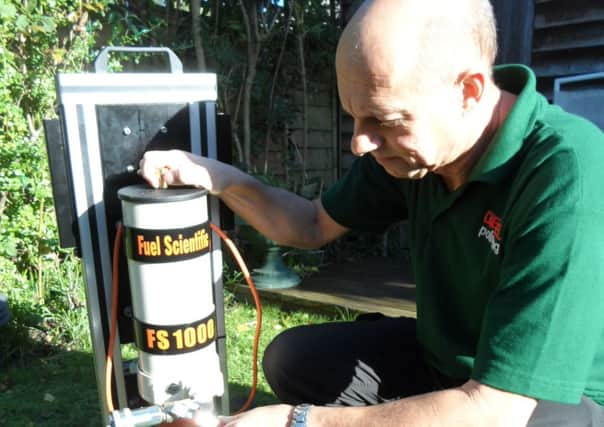A cleaner way to go green with biodiesel


Biodiesel is now a part of all fuel used in motor engines whether you’re on road or river and it has become the silent enemy. Allen Blake of Garforth, a lifelong boat enthusiast, came across the problem and was determined that his own boat was not going to suffer the same fate as his friend’s that cost £5,000 to fix as a result. Earlier this summer he also launched his own company to help others who find themselves, to use a common expression, in the same boat.
“People tend to think that biodiesel is about companies like McDonald’s running their trucks around on 100 per cent of it and with a smell of chip fat when they are on the road. The reality is not that at all.
Advertisement
Hide AdAdvertisement
Hide Ad“Every bit of diesel you buy has a certain proportion of biodiesel. At present the minimum amount is 4.75 per cent but it is generally about 8-11 per cent.
“Biodiesel reacts with just a little bit of water to cause the bacteria that is within it to grow. This comes from condensation in the tank. The bacteria grows quickly but only lives for 48 hours.
“When it dies it falls to the bottom of the tank where, over time with other dead bacteria, it forms thick horrible black goo. Inevitably as fuel is sucked up so is the goo and this clogs the filters creating problems for the machine.
“I saw a really bad one just last week and it was like thick black tar. It didn’t even get as far as clogging up the filter because it simply blocked the pick-up pipe in the tank before it got there.
Advertisement
Hide AdAdvertisement
Hide Ad“The term for the problem amongst the boating community is ‘diesel bug’. Whilst it cost my friend £5,000 to get it sorted I then found that he wasn’t the only one by a long way. And it is also a problem for both the truck and farming community. Recently I’ve been working on a boat, a crane and a JCB all with the same affliction.”
Allen believes that farmers and truck drivers have not suffered as greatly as boat owners as yet, but through his contacts he know they are aware of the problem as diesel contamination.
One of the reasons why it afflicts boats a little more is that they are generally left idle for longer. Cars, trucks and farm machinery in regular daily use the fuel much more quickly, not allowing bacteria as much opportunity to thrive.
“Boats and particularly narrow boats are often left to stand over the winter. Those that are made of metal obviously have an increased chance of condensation in the tank. The bacteria that falls to the bottom then mingles with all kinds of other stuff such as rust and clings on. So when you start up your boat after a long winter of doing nothing you might find that the first thing that stirs up is the bacteria which then clogs up your filter and you could be faced with quite a bill to put it right. As soon as I heard about my friend’s bill it panicked me into doing something about it. At first I put additives in but I wasn’t happy that this was the total solution so I started looking around for something better and more convenient.”
Advertisement
Hide AdAdvertisement
Hide AdPart of Allen’s background is in the motor industry. Allen describes it as operating like a kidney dialysis machine (my comparing it to a tea strainer, didn’t impress Allen).
“Kidneys are essentially a filter and that’s what it’s doing. How it works is we suck the fuel from a third of the way down the tank and take it into a filtration process.
“This removes anything from the fuel and then puts it back into the tank at a fast rate. When we put it back in the tank it is put to the bottom and that stirs up any contaminates.
“This gradually takes everything from the tank right the way through the machine. We ensure this is done at least three times and by the time we have finished all the contaminate has come out of the tank and we have ‘polished’ the fuel creating a much clearer, cleaner diesel tank at the same time.”
Advertisement
Hide AdAdvertisement
Hide AdAllen started his own company appropriately called Diesel Polishing in July and is already seeing great demand. Biodiesel may be a silent assassin of boats and tractors but Allen isn’t against it.
“I think we have to move towards biodiesel and other green energy resources but we just need to be more aware of potential problems that come with it. I’ll certainly be polishing my diesel in our own Freeman 30 1968 classic cruiser, making sure the two old Bedford bus engines never get clogged.”
www.dieselpolishing.co.uk